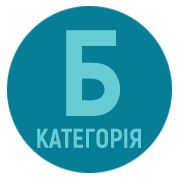Example of design
UDC 82.09
ARTISTIC INTERPRETATION AS AN OBJECT OF LITERARY STUDIES:
METHODOLOGICAL ASPECTS OF THE SUBJECT
Natalia ASTRAKHAN
Doctor of Philological Sciences, Docent,
Head of the Department of Germanic Philology and Foreign Literature
Zhytomyr Ivan Franko State University
40 V. Berdychivska Str., Zhytomyr
ORCID: 0000-0002-4087-2466
astrakhannatala@gmail.com
The article deals with the ways of viewing artistic interpretation as an object of literary studies and describes the main vectors of substantiation of the methodological foundations of understanding this phenomenon in the context of modern humanitarian knowledge and, in particular, literary theory. The interconnections among ontological hermeneutics, the philosophy of dialogue and literary anthropology are defined as productive methodological frameworks in the study of artistic interpretation. The most promising methods of literary studies in terms of solving the afore-referenced problem include receptive aesthetics, which is genetically related to literary phenomenology, and the post-structuralist paradigm within which the concept of multiple interpretations and intermedial studies gain particular significance.... (1800 characters without spaces)
Key words: literary work, artistic interpretation, receptive aesthetics, ontological hermeneutics, philosophy of dialogue, literary criticism.
ХУДОЖНЯ ІНТЕРПРЕТАЦІЯ ЯК ОБ’ЄКТ ЛІТЕРАТУРОЗНАВЧОГО ДОСЛІДЖЕННЯ:
МЕТОДОЛОГІЧНІ АСПЕКТИ ПРЕДМЕТИЗАЦІЇ
Наталя АСТРАХАН
доктор філологічних наук, доцент,
завідувач кафедри германської філології та зарубіжної літератури
Житомирського державного університету імені Івана Франка
вул. В. Бердичівська, 40, м. Житомир
ORCID: 0000-0002-4087-2466
astrakhannatala@gmail.com
У статті розглядаються шляхи літературознавчої предметизації художньої інтерпретації, характеризуються основні вектори обґрунтування методологічних засад пізнання цього явища в контексті сучасного гуманітарного знання й, зокрема, теорії літератури. Як продуктивні щодо дослідження художньої інтерпретації методологічних площин визначаються взаємозв’язки між онтологічною герменевтикою, філософією діалогу та літературною антропологією. Серед арсеналу літературознавчих методів найбільш перспективними в плані вирішення зазначеної проблеми виявляються рецептивна естетика, генетично пов’язана із літературознавчою феноменологією, та постструктуралістська парадигма, в межах якої особливого значення набувають концепція множинності інтерпретацій та інтермедіальні студії.... (1800 characters without spaces)
Ключові слова: літературний твір, художня інтерпретація, рецептивна естетика, онтологічна герменевтика, філософія діалогу, літературна критика.
Statement of the problem The significance of artistic creation and reproduction in the general cultural space is primarily revealed by the process of interpretation. By interpreting the work and its intersubjective verification, the reader enters into a dialogic relationship with the author and other people involved in the verbalization of the essential meanings expressed by the work of art...
Analysis of recent research and publications. There is a certain gap between the philosophical (hermeneutic) vision of the phenomenon of interpretation in the general cultural dimension [4; 5; 12] and substantiation of the principles of implementation of its specific options, for example, artistic interpretation and its varieties - translation, theatrical performance, cinematographic visualization, pictorial and musical illustration, etc., to which much more attention is paid [9; 11]...
The purpose of the article is an attempt to objectify artistic interpretation as an important component of the existence of a literary work and outline the methodological foundations of its literary knowledge.
Presentation of the main material of the study. According to M. Heidegger, true being is realized as understanding. Therefore, the artistic interpretation of a work of art involves the synthesis of three maxims that establish the parameters of existential-ontological understanding (being/understanding that, feeding on the experience of existence, is built on top of it): the epistemological maximum (revealing the cognitive potential of the work of art as an artistic model of reality); dialogic maximum (communicative intensity of the processes of creation and reproduction, addressed at the same time to the author of the interpreted work and to the recipients of the work-interpretation, whose existence seems to invite participation in its intersubjective verification); the personalistic maximum (the formation of a creative personality through the production of the artistic text of a new artistic work as a space open for personal growth in all directions relevant for the subject, through the achievement of artistic integrity, which is evidence of the achieved integrity of the individual)...
Conclusions and prospects for further research. This vision of the internal dialogicity of the text/work not only does not go beyond the guidelines of receptive aesthetics, but also contradicts the leading thesis of post-structuralist literary studies about the "death of the author" as a prerequisite for the "birth of the reader". That is, by reviving the author and the reader as mutually necessary subjects of dialogic interaction, the outlined conceptualization of literary and artistic creativity restores its ontological meaning...
BIBLIOGRAFIA
1. Квіт С. Виміри філософської герменевтики. Слово і час. Київ : Фенікс, 2007. № 5. С. 17–27.
2. Лімборський І. Транслаторика в контексті проблем літературознавчої компаративістики: рецепція – інтерпретація – реінтерпретація. Біблія і культура. 2016. № 17. С. 79–84.
3. Матвійчук У. Перспективи інтерпретації літературних творів крізь призму музики. Слово і час. 2016. № 1. С. 80–86.
REFERENCES
1. Kvit, S. (2007). Vymiry filosofskoi hermenevtyky [Dimensions of philosophical hermeneutics]. Slovo i chas [Word and time]. Kyiv: Feniks. Vol. 5. P.17–27 [in Ukrainian].
2. Limborskyi, (2016). Translatoryka v konteksti problem literaturoznavchoi komparatyvistyky: retseptsiia – interpretatsiia – reinterpretatsiia [Translatorika in the context of the problems of literary comparative studies: reception – interpretation – reinterpretation]. Bibliia i kultura [The Bible and culture]. Vol. 17. P. 79–84 [in Ukrainian].
3. Matviichuk, U. (2016). Perspektyvy interpretatsii literaturnykh tvoriv kriz pryzmu muzyky [Perspectives of interpretation of literary works through the prism of music]. Slovo i chas [Word and time]. 1. P. 80–86 [in Ukrainian].










